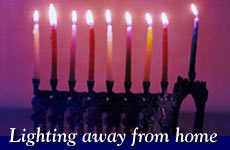 Iran’s Attack on Israel
Iran’s Attack on Israel


6 min read
In-depth laws of the menorah for travelers and guests.
1. Must one light the menorah at home?
The mitzvah of lighting the menorah is described as being "a light for a man and his home." From this we learn that the mitzvah is not only a personal one but also one that pertains to the home. Therefore, a person cannot fulfill his obligation by lighting anywhere other than at home. For example, a man may not light at work but must return home for the mitzvah.
2. When may a person light or become a partner at the home of a friend or relative?
Lighting or becoming a partner at another person's home is permitted only when sleeping at that place. A person who intends to sleep the night at his own home must light there and nowhere else. A boarder may be an exception to this rule.
3. What if a person is away from home for part or all of Chanukah (e.g. on business) but his family remains at home?
The wife or son over bar mitzvah must light the menorah at home. Strictly speaking, the husband also fulfills his obligation by this and is not required to light separately. However, according to the widespread custom, the husband lights his own menorah at the place where he is sleeping. He should make the blessings only if he lights earlier than the menorah is lit in his home. If he lights later than the menorah is lit in his home, he should not recite the blessings himself, but rather listen to someone else who is making the blessings wherever he is.
4. What if a woman is away from home during Chanukah but her husband is lighting at home?
The wife fulfills her obligation through her husband's lighting and is not required to light her own menorah. If possible, she should try to hear the blessings being recited by someone else lighting.
5. What if the wife is at home but the husband will arrive only later in the evening?
There are two options:
To avoid any misunderstanding, the couple should discuss the situation beforehand and come to a mutually acceptable arrangement.
6. What if the husband is at home but the wife will arrive only later in the evening?
If the wife agrees, the husband should light on time, thus fulfilling the obligation for himself and his wife. If the husband senses that his wife may be upset to miss the lighting of the menorah, he should wait until she arrives.
7. What if both the husband and wife go away together for a few days?
During the days that they are away from home, they should light the menorah in their new location. If any other members of the family remain at home they must light a menorah for themselves at home.
8. What should an unmarried person do when sleeping away from home?
A man should light his own menorah in the place he is lodging. A woman should become a partner with the family where she is lodging, but if she is lodging alone she must light her own menorah.
9. What if a person is sleeping away from home at one location and eating at another?
Preferably he should light at the place that he eats. If this is difficult, he may light where he sleeps.
10. Where should a person light on the day he leaves his home?
If he leaves before lighting time, he should light at his destination. But if he leaves after lighting time, he should light at home before he leaves.
11. Where should a person light on the day he returns home?
If he leaves before lighting time, he should light at home. But if he leaves after lighting time, he should light at the place he has been temporarily.
12. Does the same apply to a person who returns home on Saturday night after being away for Shabbos?
A person who intends to return home immediately after Shabbos should light when he arrives home. In this case, every effort should be made to return home quickly. A person who intends to remain at his temporary location for a while after Shabbos should light at the place he has been during Shabbos.
13. Where in a hotel should a guest light?
If permission is given, he should light in his room since this is considered his home. It is praiseworthy to eat at least one meal a day in the room. If the hotel insists that he light in the communal dining room, he may fulfill his obligation there.
14. What if a person is travelling through the night?
15. Under what conditions may one light when travelling?
One must fulfill several conditions:
If all these conditions are met, he should light with blessings, even if he is able to light only one candle. If these conditions are not met, he is exempt from lighting.
16. What if he fears that he will have to extinguish the candle(s) within half-an-hour?
He should light without saying the blessings.
Excerpted from "Guidelines" - more than 200 commonly asked questions about Chanukah (Targum/Feldheim).
Photo Credit: www.israelimage.net
